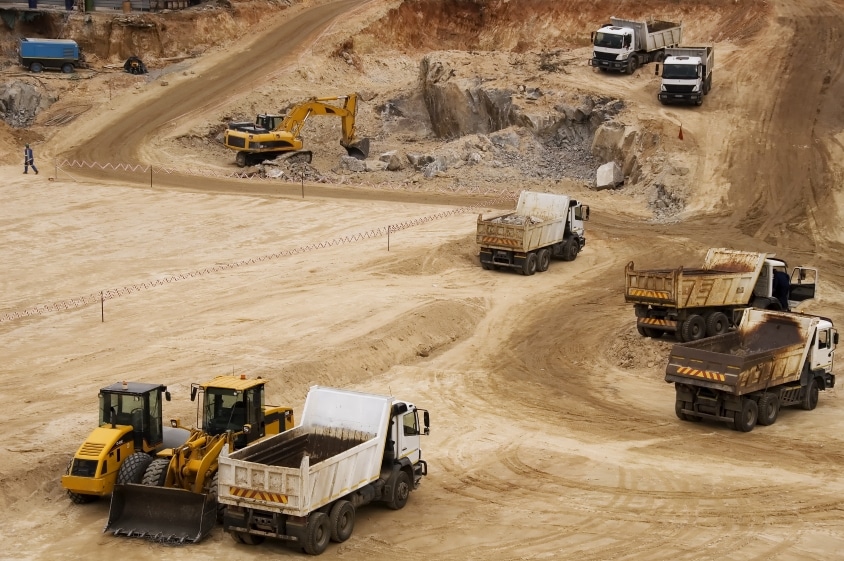Fuel for thought: 4 cost-cutting tips for contractors
Written by: Simon Pavey, Last updated:26th June 2023

Whatever the nature of your work, if you’re a contractor, then you’ll be no stranger to the high costs associated with fuel consumption. From heavy machinery and tools often requiring traditional fuel sources to the commute to job locations and supplier meetings, there are plenty of factors that drive up overheads – and managing fuel consumption is a highly sought after skill within the industry.
For construction-based contract roles including plumbing and electrician work, keeping costs low can make all the difference, especially during quieter months. With fuel prices still high following the fluctuations in the crude oil market, and the possible disruption we could see later this year, it’s important that all contractors consider implementing tactics to help manage fuel consumption and costs.
In this article, we’ll take a look at some of the most important things contractors should (and may not) know about their fuel consumption, as well as offering some tips to minimise usage and costs.
Why is contractor fuel consumption so high?
Some of the biggest factors pushing up the fuel consumption of the construction industry and other similar contractor roles include:
- The amount of fuel-dependent heavy machinery.
- Inefficient operation of vehicles.
- Servicing and maintenance.
Vehicle fuel consumption
Starting with the most universal consumer of fuel across contractor roles, vehicles are often a real gas-guzzler and cost-zapper whatever your area of expertise. Commuting in the UK accounts for as much as 18 billion KGs of CO2 emissions, and for contractors, the commute to jobs is also paired with commutes to supplier locations.
Compared to your average commuter who has two bookend journeys, contractors might be dotting from location to location across the day, and the fuel expenditure quickly adds up. Additionally, contractors are more likely to be driving vans and other heavier vehicles that push the daily carbon emissions up further.
Despite being a big consumer of fuel and consequently funds, vehicles are no expendable tool for contractors and as such the solution to keeping consumption and costs down need to take this into consideration.
But what can you do to mitigate your costs as a contractor? You can’t ditch the essential vehicles on which your company relies, and you can’t cut back on your journeys and risk losing business. Well, here’s exactly what you can do:
1. Optimise your routes with My Transport Planner
Cutting down on the number of trips seems like it might not be an option, but with the right tools this can be a great starting point for professionals wanting to save money and cut down on environmental impact. Route planning might already be a part of your day as a contractor, but are you doing it in the most productive way?
My Transport Planner is a route optimisation tool; what this means is that rather than just organising the routes you will be taking, they are optimised for efficiency, the knock-on effect being a saving in fuel, funds, and time.
2. Make the switch to electric
If you are looking for a more impactful change, changing your vehicle from a combustion engine to an electric could be a great long-term solution. Electric vans and larger vehicles are quickly catching up smaller EVs in terms of mileage and are becoming a more than viable alternative to traditional vans. Roomy interiors mean plenty of space for tools and equipment, so making a sustainable switch doesn’t have to mean losing out on valuable square footage.
While this can be considered a costly switch, there is the plug-in grant available for buyers in the UK offering an automatically added discount to some models of electric van to help increase accessibility. As for the implementation of charging infrastructure, there are a range of schemes and grants in place to help support with the purchase and installation of charge points both at home and at the workplace, including the Workplace Charging Scheme and The EV charge point grant.
Though the upfront cost can seem off-putting, electric vehicles can quickly start paying themselves back. The cost of charging your electric vehicle is likely to be considerably lower than the cost of refuelling with petrol or diesel, and with an electric vehicle you are better prepared to weather any fluctuations in the fuel market. For contractors, an electric vehicle could be the update needed to help build a more financially secure operational routine.
3. Improve your maintenance and servicing
Maintenance and servicing can often come as a bit of a surprise if you aren’t keeping track of your schedule as a contractor. The busy, hands-on nature of contracting work often means that the cost of vehicle upkeep can creep up, and with it the costs it entails.
The upkeep of your vehicle is closely tied to fuel consumption, and as such it is in your best interest to ensure you remain on top of the necessary servicing and maintenance of your vehicle. In fact, improper vehicle maintenance can increase fuel consumption by as much as 2-4%.
Ensuring that you are in good time with vehicle servicing and maintenance and that you deal with vehicle complications, and wear and tear quickly will help you to avoid this increase. You can effectively manage your vehicles’ servicing and maintenance schedule with tools such as MyService.Expert, and keep on top of vehicle checks with MyDriveSafe.Expert.
4. Review your construction plant and machinery
On many construction sites, the fleet of vehicles doesn’t stop with the distribution vehicles. From excavators and backhoes to cement mixers and cranes, there are a broad range of vehicles other than your traditional vans that contribute to contractor fuel consumption. Many of these pieces of essential equipment still rely heavily on diesel, making them some of the most consumptive pieces of equipment contractors are commonly using.
In order to maximise fuel efficiency of these pieces of machinery, useful measures mostly focus on site usage. Below are some tips on how you and your workforce can boost the fuel economy of heavy machinery.
Reduce idling time
Leaving your machinery idling eats through fuel, increases emission and can even decrease the longevity of your plant. Keeping machine engines turned on only for the necessary amount of time will help to prevent avoidable wear and tear, which will help them to perform efficiently for longer. Stop-start technology, if present on equipment, is helpful for this – and having a conversation with your drivers about idling could be beneficial.
Keep up with maintenance
As with your vans and cars, construction plant also needs to be regularly maintained to ensure that fuel efficiency is preserved. Preventative measures are better than dealing with issues too late, and not only will this practise help with fuel consumption but will also help you avoid paying larger costs further down the line.
Ensure your staff are fully trained
Incompetent use of equipment can mean that it is used in a more fuel consumptive manner, the costs of which will add up. Ensure that the workers operating heavy machinery are fully trained on how to use it safely and efficiently. Incorrect use of large pieces of equipment can strain their engines, causing damage and forcing them to work harder than necessary, causing an increase in fuel consumption.
Managing costs and consumption
With the fuel market in an ongoing state of flux, contractors could benefit from utilising tactics to help ensure that fuel usage is economic. Workers have no control over the cost of fuel, but you can control the way your vehicles and equipment are used to help ensure you are not paying more than necessary and are keeping emissions low.
In addition to using the software and tools discussed in this article, fleet managers could benefit from the right fuel card to help access the bests fuel prices as well as a host of benefits that could increase fleet savings. With a variety of providers to choose from and a growing range of EV charge cards too, we have a range as diverse as contractors’ fleets.
You can browse our fuel cards, or fill out an enquiry form and we will help you to find the right fuel card for your needs.
back



